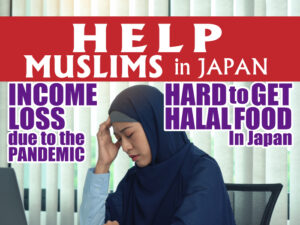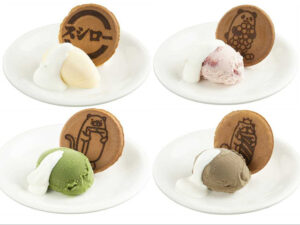TAKEX takes on SEA halal market, Bamboo sanitizer & shelf-life extender
A company that researches, develops, manufactures and sells sanitisers, food additives and more made from bamboo—TAKEX. While the products contain ethanol (a type of alcohol), they are certified as Halal by JAKIM. The company has been developing ‘halal sanitisers’ and ‘halal shelf-life extenders’ of Japanese quality (a leading nation in hygiene) in Malaysia and other Southeast Asian markets.
We had the pleasure to speak with President Kumi Okada of Takex Co., Ltd./Takex Labo Co., Ltd. to learn how they develop products and reach out to the Southeast Asian Islamic markets. And their current-upcoming plans in the Covid-19 pandemic.
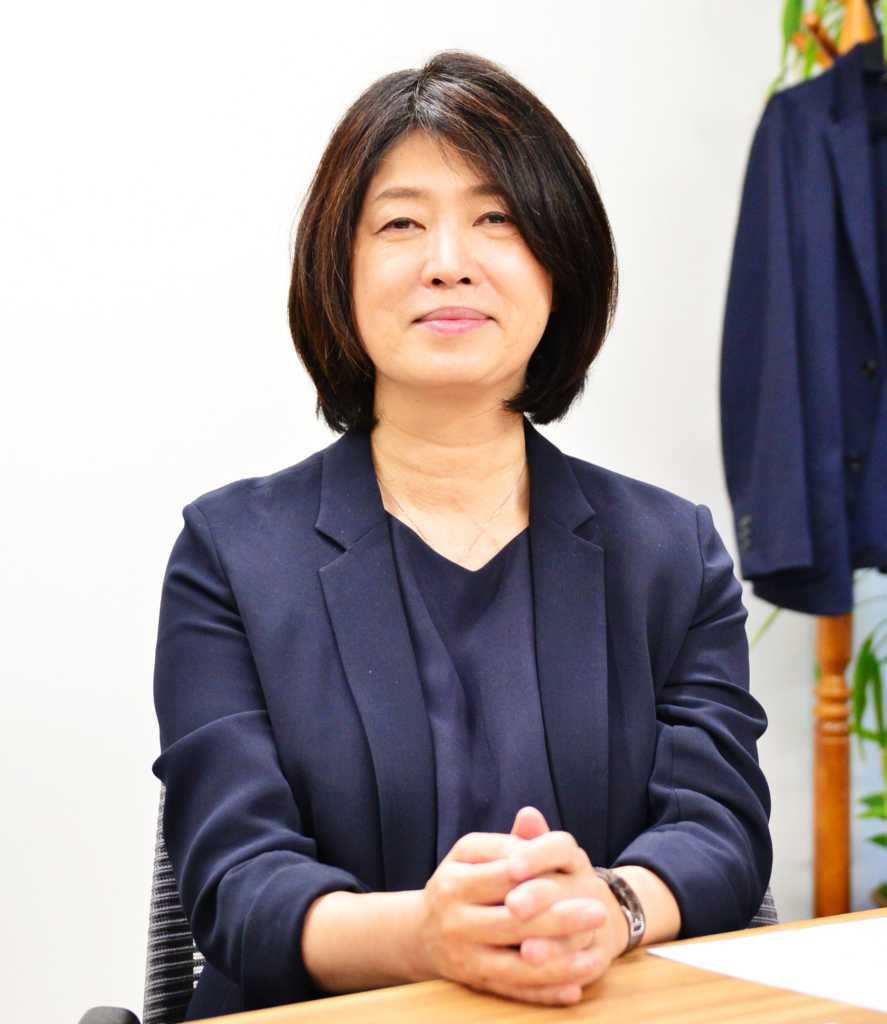
Encounter with Bamboo
Because her family was involved in bamboo work, President Okada is deeply connected with bamboo and said, “I knew first-hand of bamboo’s special qualities”. Then, in her teens, President Okada had to spend her days in hospital when she suffered a severe illness. She recalls that it was during her time in hospital that she realised the importance of food safety.
And from her sickbed, the idea of using bamboo’s natural components as an alternative to food additives from chemical substances, which cause allergic reactions, inspired her to carry out an R&D.
The treatment kept her out of the ordinary high school life. But as she looked around, she saw her friends steadily moving towards their own goals. Glancing at others enjoying youth, “I want to leave an imprint of what I lived through” was the sole motivation to pour her passion into developing and commercialising products using bamboo’s properties.
President Okada was just a young woman in her early twenties at the time.
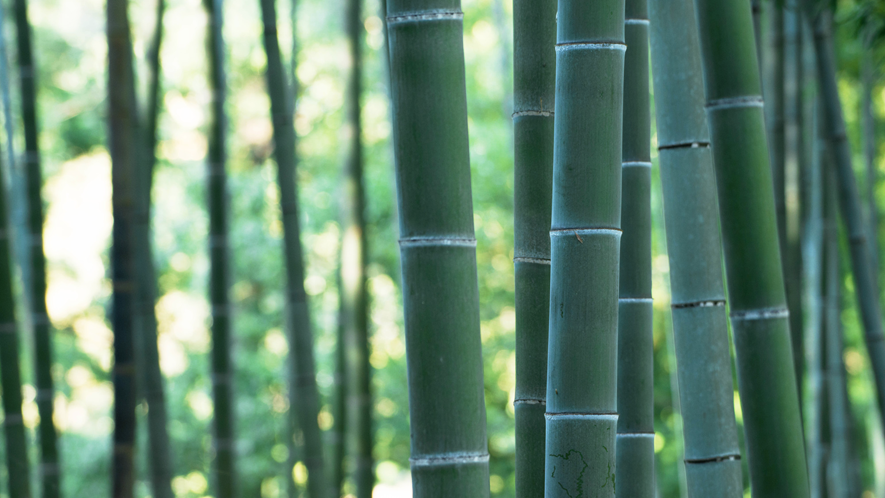
Bamboo Research & Product Development
As a venture company, collecting development funds was a challenge. However, seeing President Okada’s unrelenting commitment, those around her gave the support needed to reinforce the business. For President Okada, the hardest and most time-consuming part was ‘basic research on bamboo growth’.
There were times when bamboo wasn’t as effective as expected, and other times when it worked well during R&D; This IS precisely the main task that stood in the way.
While there was some documented information on the ecology of the familiar plant bamboo, hardly any institutions were studying it from a scientific angle at the time.
Bamboo is well-known for its rapid growth, as seen in the Japanese proverb: “Bamboo shoots outdo one’s parents (takenoko no oyamasari)*”. Bamboo shoots, connected by underground stems, grow up to nearly 20m in about 60 days. This rapid growth comes from the growth components supplied to them by the parent bamboo. This inconsistent secretion of the growth component was behind the highly uneven research results.
*Takenoko no Oyamasari 竹の子の親勝り: Since bamboo shoots grow fast, becoming taller than the parent bamboo in no time, it refers to the children’s being better than the parent.
“Bamboo sometimes betrays our expectations, sometimes it amazes us. It’s a very peculiar plant”. So says President Okada.
Having conducted various researches on bamboo, TAKEX is now the place to go for all things bamboo. Nowadays, many companies and institutions turn to the company for enquiries about antibacterial, antioxidant, odour control and other bamboo-related R&D. And so, TAKEX stands solid as a leading company in bamboo research.
Enter Southeast Asian Islamic Markets
TAKEX then went on to sell sanitisers and shelf-life extenders with bamboo’s antibacterial substances in Japan. But, Japan has already reached its maturity in this field. “If we’re going to invest the same amount of resources, we want to capture a fast-growing buffer”. With this in mind, President Okada set out to go abroad.
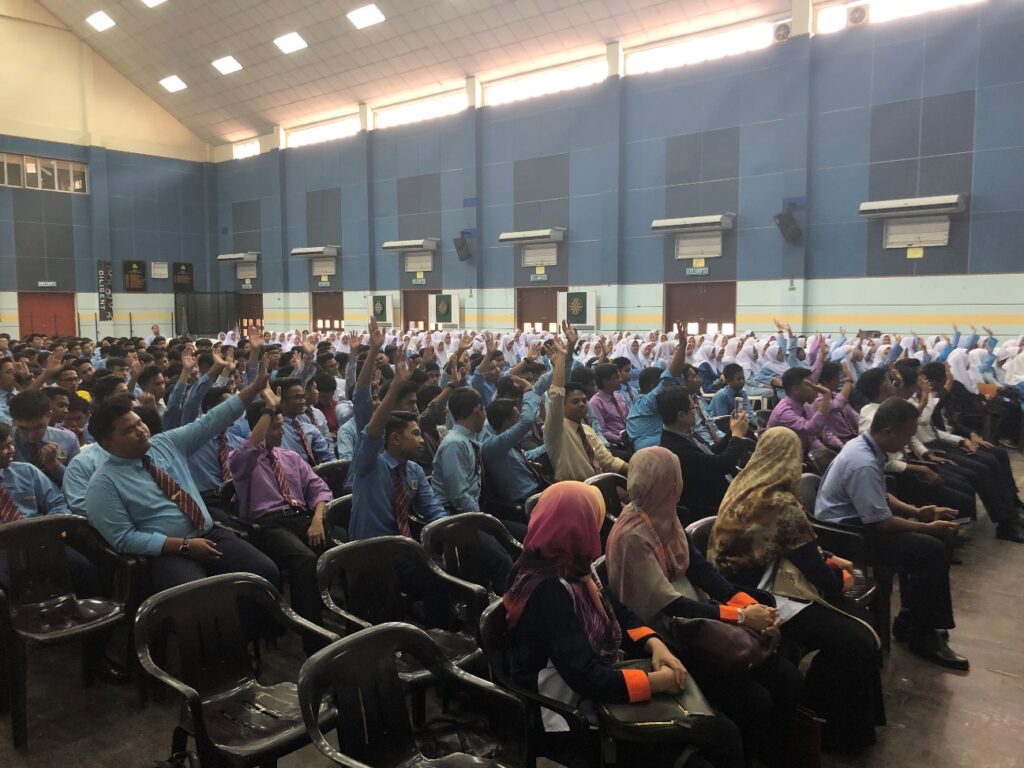
What caught the company’s eye was the Islamic market in Southeast Asia.
On a global scale, Muslims are likely to overtake Christians as the world’s most populous religion by 2050. The prevalence of bacteria-prone environments in the warm-humid climate, and the habit of using hands to eat on large plates, were also seen as mega potential demands for improving hygiene.
When it comes to Muslims, “Halal” is the thing we must note. Given that drinking alcohol is forbidden in Islam, it was vital to keep up a steady effort to promote awareness of the importance of hygiene.
Back then, there were no halal-certified food grade ethanol disinfectants available. Even TAKEX’s local team voiced their discomfort of keeping items in a warehouse with non-Halal certified ethanol products.
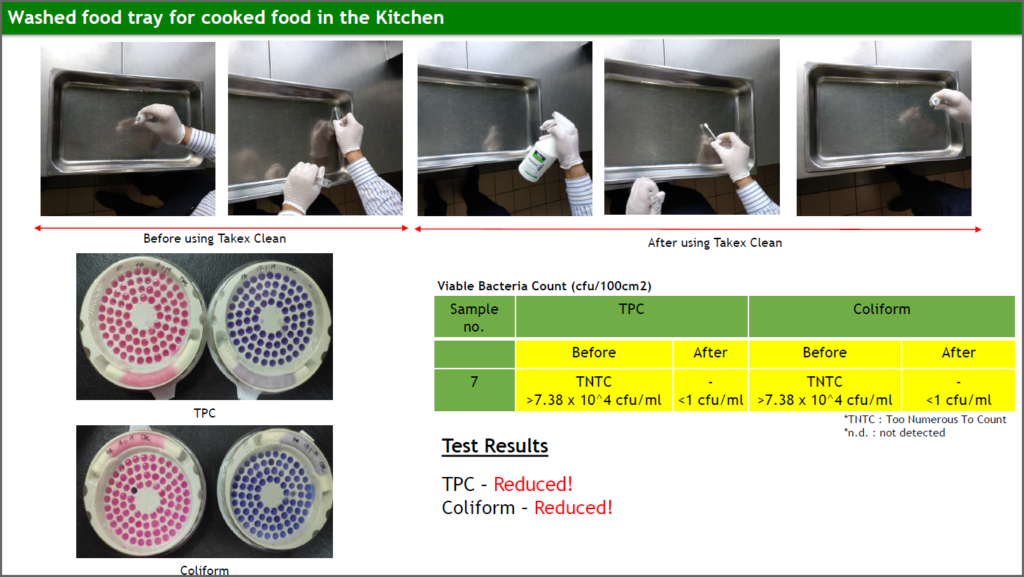
The first step was to find out how Muslims in Malaysia live in their usual settings. Bacteria are tiny beings invisible to the eye. So they began efforts to get a clearer picture of this by visualising the situation.
The awareness campaign is supported by Malaysian government agencies and NGOs, with the help of mainly Islamic primary/secondary schools and universities.
Reports on local conditions without proper cold chains were also received, noting a new business potential due to “food waste losses” and “extending shelf life”. Nevertheless, when it comes to commercialising and selling, especially in Malaysia and other Southeast Asian markets, there is a gap in the living cost with Japan. It makes Japanese products feel rather pricey than similar products in the local market.
As hygienic products are sometimes associated with “life”, they tried to counter price-consciousness by claiming product safety and assurance based on scientific and epidemiological evidence. Instead of “anything goes as long as it does something similar”.
Safety Assurance and New Added Value
In 2021, news media daily reported on the outbreak of COVID-19 (novel coronavirus) in Southeast Asia like Indonesia, Malaysia and Thailand. Demands for hygiene products and awareness of them are at a completely different stage than before. As if reflecting this awareness and feedback of consumers, the company products gained new added value. They announced reports of its alcohol formulation that includes extracts of bamboo as effective against the novel coronavirus (SARS-CoV-2).
President Okada mentioned that TAKEX focuses on BtoB and BtoC sales in the Islamic market, with the majority being BtoB. Recently, they expanded into online sales via Shopee and Lazada, the two leading e-commerce malls in Southeast Asia.
Cooperation with local distributors is a must for BtoB extension. But fees are often charged for shelf space at shops or exclusive distributorship offered as a condition: these are just everyday occurrences. The differences in business practices compared to Japan make it a unique market.
That is how TAKEX, as a manufacturer, can handle themselves by branding themselves with a clear product distinction from the rest. Also, they enhanced their proposals and production to entice dealers to place their products.
For example, you can extend a product’s shelf life by 3, 5 or 7 days using TAKEX’s shelf-life extenders. It can lead to reduced waste or even create a new revenue stream by extending the life of foods that were once unsuitable for export. Adding new values like so helps in branding the product as one that stays out of price competition.
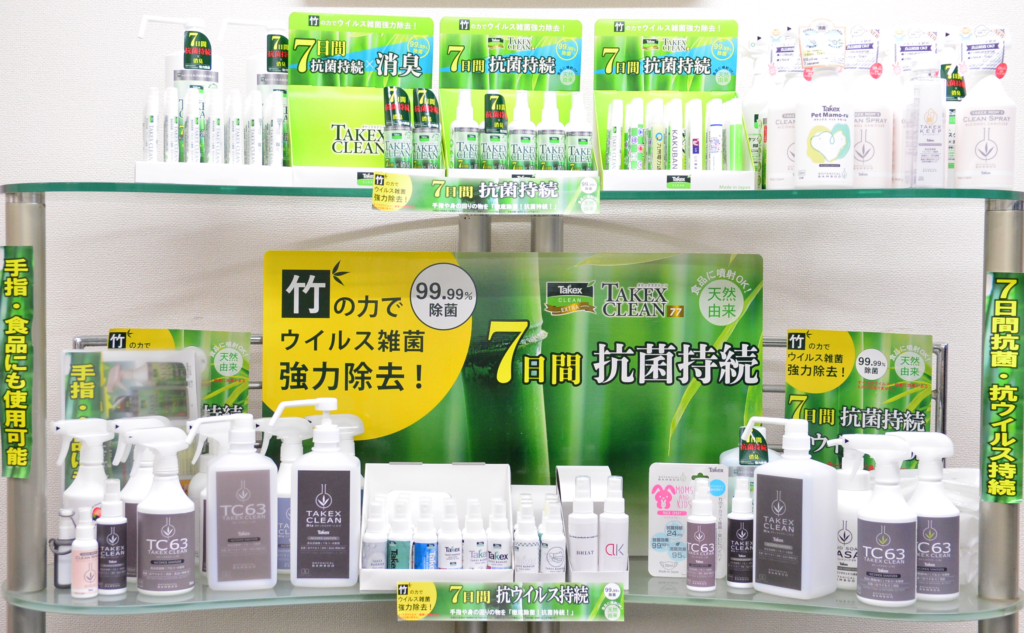
Markets in Pandemic and the Road Ahead
In the Japanese market, the main clients for hygiene products have been restaurants, hotels and wedding halls, but demands from these sectors significantly reduced in the COVID-19 pandemic. And when you look at the BtoC market, you see an overall rapid increase, yet there are also many new entrants to the genre from other industries. To avoid being buried in the packs, one’s branding should be reinforced with a clear identity to keep out of price wars.
Meanwhile, there is a rapidly growing demand for long-lasting products for food additives since the restaurant and hotel industry is embarking on the delivery and takeaway business in tandem. TAKEX products are easy to use, just like seasonings, and delivery parties have been very positive about them.
With global warming on the rise, it looks like this demand might last for a while, not only in summer but also into winter.
Beyond the existing products, the company is also working on segmentation to meet the needs of children and pets.
For overseas expansion, they’re currently targeting Malaysia, Indonesia, Singapore, Thailand, and Turkey, a country with a high-income level and 83 million people, 98% of whom are Muslim.
The company would eventually like to enter the Middle East market. But with the pandemic restricting its marketing and other activities, progress has been slow. If you don’t KNOW the country you want to enter, you can’t even formulate a strategy. She expressed her unsettling state of mind.
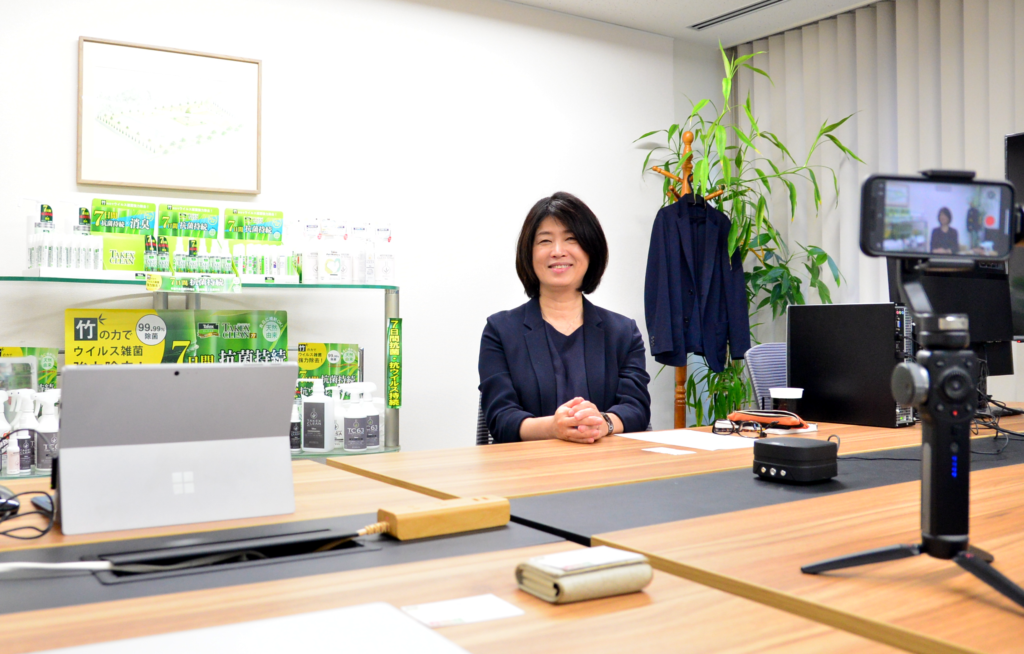
COVID-19 is an unprecedented event on a global scale. Every person, business and organisation in the world are affected by it.
President Okada concluded the interview: “It’s precisely at times like these that we have to prepare by taking measures against infections”. ” When it comes to hygiene products, if we are price-conscious, we tend to leave something out in safety and quality. We would love to contribute to ensuring safety and wellness among Muslims by bringing our products with solid evidence to the Islamic market”.
We have a network of Japanese companies keen to expand into the Halal market in Malaysia & Indonesia.
If you are interested in connecting with sustainable technology companies in Japan, simply JOIN the network from below. We will match the right one for you!



